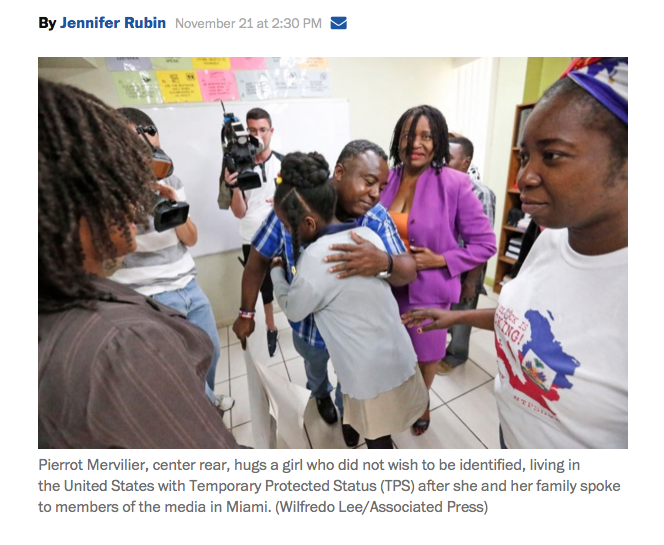The Trump administration has given nearly 60,000 Haitians with provisional legal residency in the United States 18 months to leave, announcing Monday that it will not renew the Temporary Protected Status (TPS) that has allowed them to remain in this country for more than seven years.
The decision came after the Department of Homeland Security determined that the “extraordinary conditions” justifying their presence in the United States following a 2010 earthquake “no longer exist,” a senior administration official said. . . . Successive administrations have regularly renewed their status, and many of the Haitians have U.S.-born children.
But the Trump administration has repeatedly noted that the program was meant to be temporary, not a way for people to become long-term legal residents of the United States. Administration officials have said that decisions about further extensions will be made on the basis of whether initial justifications for protection still exist.
Interestingly, Florida, which has also seen a huge influx of Puerto Ricans, has more than half of the Haitians at issue. (“[Florida] lawmakers had asked that [the Haitians] be allowed to remain. The lawmakers cited ongoing economic and political difficulties in Haiti, the poorest country in the Western Hemisphere, as well as a still-raging cholera epidemic.”) They, too, have reason to be aggrieved by the administration’s cold-hearted actions.
There is no particular need –aside from red meat for the anti-immigrant base — to expel these law-abiding people who have made their home here for as long as seven years. Florida’s unemployment rate of 4.1 percent does not suggest that they have displaced U.S.-born workers. And the notion that these people can return to Haiti to enjoy a decent life is belied by the facts on the ground there. As the Chicago Tribune reports, “While Haiti has made advances spurred by international aid since the quake, it remains one of the poorest nations in the world. More than 2.5 million people, roughly a quarter of the population, live on less than $1.23 a day, which authorities there consider extreme poverty.”
The lack of humanity is evident in the administration’s anti-family action. “The senior official who briefed reporters said that the 18-month ‘wind-down’ period for the Haitians was enough time ‘to allow families with U.S.-born children to make decisions about what to do, and make arrangements,” the Post reports. What would those arrangements be? Splitting up families? Uprooting children who know no home but the United States? The hardship on those Haitians is immense, while the “benefit” to the United States is nonexistent.
Sen. Marco Rubio (R-Fla.) pleaded for relief for these people in a recent op-ed:
That’s why I continue to urge the administration to extend Haiti’s TPS designation for 18 more months. As Chairman of the Senate Foreign Relations Subcommittee on the Western Hemisphere and as a member of the Senate Appropriations Committee, I continue to strongly support U.S. initiatives that promote good governance and security, combat poverty and health epidemics, and advance economic opportunities for the people of Haiti.
His plea was ignored, and he now must decide if he intends to make this a “must include” issue to resolve in next month’s budget deal. If he really cares about the issue, Rubio can use the spending bill as a vehicle to spare the Haitians from deportation.
In September, Democrats saw the handwriting on the wall, the Miami Herald reported:
Democrats argue that repeatedly bringing up TPS during every DACA protest and getting business leaders to realize the disruption to labor markets if 58,000 Haitians are required to leave will increase public pressure on Trump to grant the TPS extension.
“If all the Haitian workers at Fort Lauderdale International Airport left tomorrow, they would have the messiest bathrooms of any airport, even messier than LaGuardia,” said Rep. Alcee Hastings, D-Fla.
Voters in Florida should make their objections heard, especially in the 2018 midterms. If business objects to this needless attack on the local economy and Floridians are outraged, they need to support candidates who pledge to reverse the decision.
TPS, coupled with the DACA reversal and the Trump administration’s other anti-immigrant gambits, may well figure in the 2018 elections. One GOP House seat (Fla-27) is already leaning Democratic while the Florida 26th is a good pick-up chance for the Democrats. Florida also has a Senate and gubernatorial race in 2018. As in Virginia, voters frustrated with the Republicans’ divisive brand of politics could well decide to throw them out so they can keep their neighbors, friends and colleagues.
